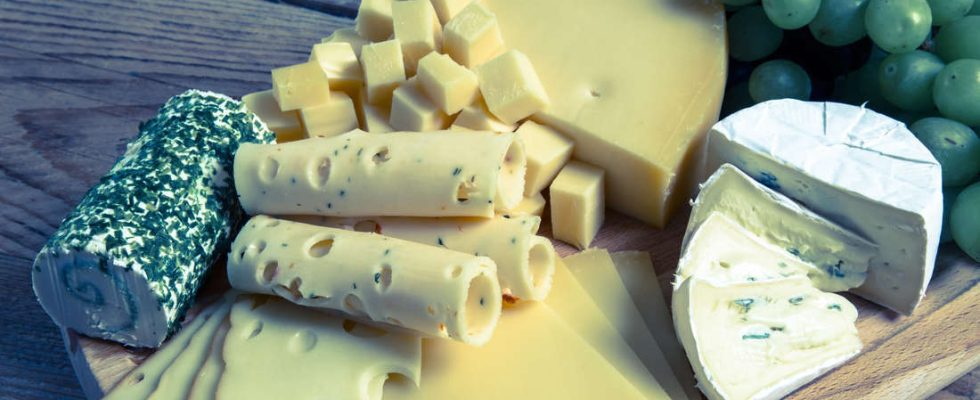Press
On bread, out of the oven or on pizza – cheese belongs everywhere. Despite its unhealthy reputation, there is at least one cheese that is the healthiest.
Cheese is a popular product as a topping on bread or to bake dishes in the oven. However, according to nutritional guides, the animal product cheese is anything but healthy. But at least the German Nutrition Society (DGE) still recommends that dairy products (including cheese) are part of a healthy diet. You should just keep the amount as small as possible. Based on nutrient content, studies and numerous nutritional guides HEIDELBERG24 compiled a list of the healthiest cheeses.
It’s best to enjoy cheese in moderation
In addition to elementary nutrients such as protein and fat, cheese also provides important minerals and vitamins. Proteins, calcium and B vitamins are integral components of the dairy product. The calcium in cheese gives bones and teeth stability, is involved in blood clotting, keeps cell walls stable and ensures smooth transmission of stimuli in the nervous system and muscles. But despite the healthy substances, it is important to only enjoy cheese in moderation.
The German Nutrition Society recommends an amount of 50 to 60 grams of cheese per day for an adult. This corresponds to two normally cut slices. In addition to plenty of fat and calories, cheese also contains a lot of salt and saturated fatty acids. When it comes to cheese, you should be careful about the amount, because it gets too quick the healthiest vegetables Too much gratinated cheese can quickly become unhealthy.
What are the three healthiest cheeses?
Saturated fatty acids are considered unhealthy because they have a negative impact on cholesterol levels and can increase the risk of cardiovascular disease. High salt consumption promotes the development of cardiovascular problems such as high blood pressure. With all the different types of cheese, there has to be a healthiest cheese, right?
Since health depends on various factors, such as individual nutritional needs and preferences, it is not so easy to say in the case of cheese. However, some cheeses can be considered healthier because they contain less fat and sodium. However, it still applies to all types of cheese that the quantity makes the poison. Mozzarella is in first place because with 20 grams of protein per serving, it is not only low in fat, but also a real source of protein. Other “healthy” cheeses include:
- 1st place: mozzarella
- 2nd place: cottage cheese
- 3rd place: Emmental
Which cheese has the best nutritional values?
Not only does cottage cheese take second place in the healthiest cheese ranking for its protein-providing properties, the cheese is also particularly low in calories. With 102 calories and a whopping 13 grams of protein per 100 grams, it is particularly suitable for people who want to lose weight. Emmental cheese, on the other hand, is saltier and higher in fat, but is full of vitamin D, proteins and potassium. How healthy is cheese for your teeth??
Cream cheese also only contains a small amount of calories. 105 kilocalories per 100 grams of cheese should please anyone on a diet. If you can get used to the taste, which takes some getting used to, you can also use Harz cheese. It even has 30 grams of protein per 100 grams and also comparatively few calories (131 Kcal / 100 grams). Mozzarella, on the other hand, is slightly higher in calories at 255 kilocalories per 100 grams, but is still in first place in the ranking. Fat and calorie content of the most popular cheeses:
| Type of cheese | Calories in kcal | Fat in grams |
| cottage cheese | 102\t | 4 |
| Cream cheese, 20% fat in dry matter | 105 | 5 |
| Harz cheese, 10% fat in dry matter | 131 | 1 |
| Ricotta, 20% fat in dry matter\t | 174 | 15 |
| Mozzarella, 40% fat in dry matter\t | 255 | 20 |
Which types of cheese should you not eat?
There are big differences between the individual types of cheese. Blue cheese, halloumi or sheep’s cheese are very salty. According to AOK, there is generally a relatively high amount of salt in every cheese that has matured for a long time. What makes cheeses like cottage cheese, mozzarella or Emmental relatively healthier is their low salt content. But hard and semi-hard cheeses in particular contain a lot of calcium. Despite large differences in nutritional values, fats and salt content, one type of cheese takes absolute last place and is therefore the unhealthiest cheese in the ranking: processed cheese.
The salts in processed cheese consist of phosphates, which cause bones and vessels in particular to age more quickly. They damage the kidneys and increase the risk of heart attack and stroke. But it’s also generally worth replacing cheese that contains fat or salt with healthier versions. All you have to know is which fridge compartment cheese belongs in. (rah)

